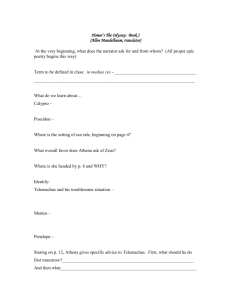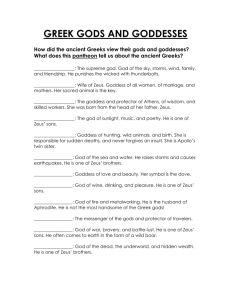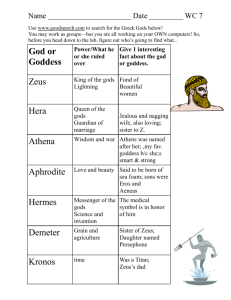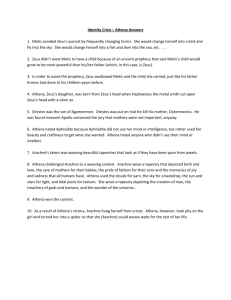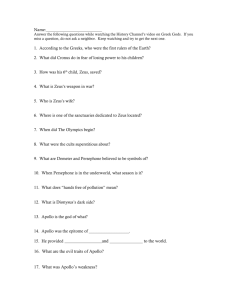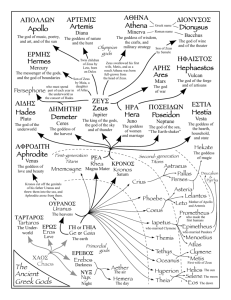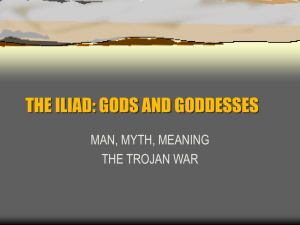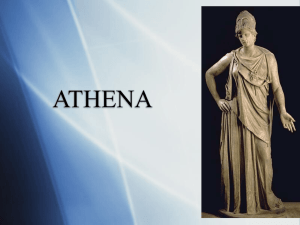All the Gods and Athena
advertisement
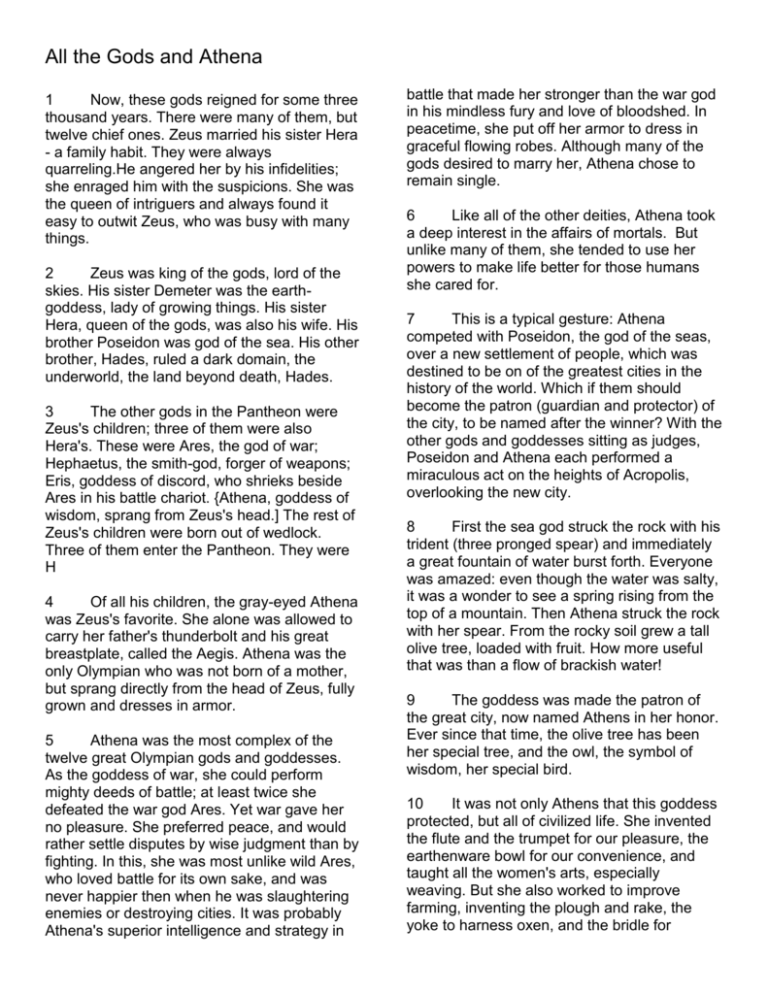
All the Gods and Athena
1
Now, these gods reigned for some three
thousand years. There were many of them, but
twelve chief ones. Zeus married his sister Hera
- a family habit. They were always
quarreling.He angered her by his infidelities;
she enraged him with the suspicions. She was
the queen of intriguers and always found it
easy to outwit Zeus, who was busy with many
things.
2
Zeus was king of the gods, lord of the
skies. His sister Demeter was the earthgoddess, lady of growing things. His sister
Hera, queen of the gods, was also his wife. His
brother Poseidon was god of the sea. His other
brother, Hades, ruled a dark domain, the
underworld, the land beyond death, Hades.
3
The other gods in the Pantheon were
Zeus's children; three of them were also
Hera's. These were Ares, the god of war;
Hephaetus, the smith-god, forger of weapons;
Eris, goddess of discord, who shrieks beside
Ares in his battle chariot. {Athena, goddess of
wisdom, sprang from Zeus's head.] The rest of
Zeus's children were born out of wedlock.
Three of them enter the Pantheon. They were
H
4
Of all his children, the gray-eyed Athena
was Zeus's favorite. She alone was allowed to
carry her father's thunderbolt and his great
breastplate, called the Aegis. Athena was the
only Olympian who was not born of a mother,
but sprang directly from the head of Zeus, fully
grown and dresses in armor.
5
Athena was the most complex of the
twelve great Olympian gods and goddesses.
As the goddess of war, she could perform
mighty deeds of battle; at least twice she
defeated the war god Ares. Yet war gave her
no pleasure. She preferred peace, and would
rather settle disputes by wise judgment than by
fighting. In this, she was most unlike wild Ares,
who loved battle for its own sake, and was
never happier then when he was slaughtering
enemies or destroying cities. It was probably
Athena's superior intelligence and strategy in
battle that made her stronger than the war god
in his mindless fury and love of bloodshed. In
peacetime, she put off her armor to dress in
graceful flowing robes. Although many of the
gods desired to marry her, Athena chose to
remain single.
6
Like all of the other deities, Athena took
a deep interest in the affairs of mortals. But
unlike many of them, she tended to use her
powers to make life better for those humans
she cared for.
7
This is a typical gesture: Athena
competed with Poseidon, the god of the seas,
over a new settlement of people, which was
destined to be on of the greatest cities in the
history of the world. Which if them should
become the patron (guardian and protector) of
the city, to be named after the winner? With the
other gods and goddesses sitting as judges,
Poseidon and Athena each performed a
miraculous act on the heights of Acropolis,
overlooking the new city.
8
First the sea god struck the rock with his
trident (three pronged spear) and immediately
a great fountain of water burst forth. Everyone
was amazed: even though the water was salty,
it was a wonder to see a spring rising from the
top of a mountain. Then Athena struck the rock
with her spear. From the rocky soil grew a tall
olive tree, loaded with fruit. How more useful
that was than a flow of brackish water!
9
The goddess was made the patron of
the great city, now named Athens in her honor.
Ever since that time, the olive tree has been
her special tree, and the owl, the symbol of
wisdom, her special bird.
10
It was not only Athens that this goddess
protected, but all of civilized life. She invented
the flute and the trumpet for our pleasure, the
earthenware bowl for our convenience, and
taught all the women's arts, especially
weaving. But she also worked to improve
farming, inventing the plough and rake, the
yoke to harness oxen, and the bridle for
horses. She gave us the chariot and the ship;
she first taught us the science of mathematics.
11
During the Trojan War (a ten year war
between the Greeks and the Trojans caused
by the kidnapping of Helen of Troy by the
Greek warrior Paris) many of the Olympians
took sides; in fact, it was a much a war among
the gods and goddesses as between the
Greeks and Trojans. Athena took the side of
the Greeks, and long after they had won the
war, she continued to help them. She watched
after Odysseus during his ten-year journey
home from war, offering him advice and
assistance when he most needed it.
12
Athena, called Minerva by the Romans,
was unique among the deities. She defies
heroism in a new way: courage does not
necessarily mean fighting, but standing firm for
what is right (justice). She can serve as a
model for women everywhere. The divine
protector of human civilization, the goddess of
war who preferred peace, the judge who
believed in mercy - this was indeed a gracious
goddess, and a wise one.
1. What is ironic about Athena being the
goddess of war?
A. She beat her brother Ares, the
god of war, several times in battle
B. She preferred peace over war
C. She was Zeus’ favorite child
D. She was intelligent and a great
strategist
2. Athena was unlike the other gods in that
she
A. was not interested in marriage
B. was favored by Zeus
C. didn’t take sides in the Greek &
Trojan was
D. used her powers to help humans
3. Which of the following is a symbol said to
be attributed to Athena
A. an olive tree the symbol of fertility
B. a ship the symbol of journeys
C. an owl the symbol of wisdom
D. an earthenware bowl the symbol of
plenty
